For Sale!
Historic Seattle is selling the Egan House.
Historic Seattle is selling the Egan House.
Each year, Historic Seattle honors outstanding people and projects in preservation at our Annual Preservation Celebration. To do this, we need your help!
We want to hear from our entire preservation community about what preservation projects YOU think are worthy of celebrating. The deadline to submit is Friday, May 10.
Preservation is a Public Benefit
In the past month and a half, preservation supporters in Seattle came together to advocate for maintaining the integrity of the landmark designation process. Since 1973, the City of Seattle has designated approximately 450 landmarks that are subject to protection by the Landmarks Preservation Ordinance (LPO). Ostensibly, the recent controversy revolved around the landmarked Seattle-First National Bank Building (SFNB), located at 566 Denny Way in Uptown, but it became much bigger than that one landmark.
Background
The Seattle-First National Bank Building was designated a Seattle landmark in 2006 under four (out of six) designation standards, a strong statement by the Landmarks Preservation Board (LPB) in recognizing the significance of the building. The exterior and the site were included in the designation. Walgreens purchased the property in 2007 (one year after the designation), adapted the former bank into a retail store, and worked with the Landmarks Preservation Board to reach a Controls and Incentives (C&I) agreement in November 2021 that would apply to the site and exterior of the building. (Controls help to protect a landmark and economic incentives can help an owner maintain a landmark.) The final step in the landmark designation process is City Council approval of the designating ordinance and adoption of the C&I agreement.
Because the SFNB is located in the Uptown neighborhood of Queen Anne, it is eligible as a landmark sending site for Transfer of Development Rights (TDR). This is an important financial incentive that became available for Uptown only in the last few years. The owner can sell TDRs and use the money to maintain the landmark building. A developer who owns a property in Uptown that qualifies as a receiving site can purchase the TDRs to benefit their housing project by increasing FAR (and therefore, additional units). This is a win-win for preservation AND housing. It’s both/and, not either/or.
The Issue
OK, great! So, what was the problem? On December 9, 2022, the City Council’s Neighborhoods, Education, Civil Rights, and Culture Committee met to review Council Bill 120312 (an ordinance relating to historic preservation; imposing controls upon the Seattle-First National Bank Building). At that meeting, four members of the Committee questioned why the Seattle-First National Bank Building was landmarked (they did not believe it was significant), wondered what public benefit the landmark offered, and cited the need for more housing in Uptown, a dense urban neighborhood. Essentially, the Committee believed this landmark was getting in the way of more housing and they wanted to dictate the use on this privately owned property. However, the LPO does not give the LPB nor the Council authority to control use in a landmark building or site. The property is not for sale and there are no redevelopment plans for the site. Uses other than housing are also allowed on the parcel.
The Council Committee recommended to the full City Council that they reject the designating ordinance. We saw this recommendation as a major threat to preservation in Seattle and the City’s preservation program. Removing C&I would leave the landmark vulnerable to demolition and set a bad precedent that could undermine the landmark designation process for any designated landmark that does not have controls and possibly any future designated landmarks.
The Call-to-Action
CB 120312 was scheduled for the January 3, 2023 City Council meeting and then postponed for another week to January 10, 2023. Historic Seattle, the Queen Anne Historical Society, West Seattle-based advocates, the Washington Trust for Historic Preservation, and many individuals jumped into action in December and January to urge Councilmembers to honor the Landmarks Preservation Ordinance and designation process by passing the designating ordinance and adopting controls and incentives for the Seattle-First National Bank Building. A key message was that preservation and housing are not mutually exclusive—this is a false choice. It’s both/and, not either/or. We also supported a compromise that would place no controls on the parking lot north of the landmark building—making it easier for potential development. Council Central Staff provided an analysis of housing development potential on the parcel. It turns out that retaining the landmark could potentially yield more housing units on the site by using a combination of incentives, bonuses, and creative design of new construction. Detractors argued the parking lot is too small for a high-rise. We beg to differ given the many examples of high-rise residential construction on smaller or similar-size lots in this city.
The road to the January 10 City Council meeting was a wild one! There were three amendments to the original bill. The Council realized it could not de-list or “unlandmark” the building so the designation would remain. It is the role of Council to adopt, modify, or reject controls and incentives for a landmark. The Walgreens lawyer suggested to Council that they pass the designating ordinance but remove controls and incentives. So it became the battle of the amendments. Amendment A (proposed by Councilmember Tammy Morales) was to pass the designating ordinance but place no controls and incentives on the building and site (worst-case scenario in our minds). Amendment B (proposed by Councilmember Lisa Herbold) was to pass the designating ordinance and place controls on the exterior of the building and specific character-defining features on the site, but remove controls on the parking lot. Amendment C (proposed by Councilmember Andrew Lewis) supported Amendment B but would also remove the character-defining features on the site, effectively placing controls on the building, the site between the building and Denny Way, and the site between the building and 6th Avenue N. Are you still with us? Crazy, we know!
Historic Seattle supported Amendment B. And ultimately, we supported Amendment C. The result was City Council voted 9-0 for Amendment C which places controls on the landmark building’s exterior and the portion of the site between the building and Denny Way and between the building and 6th Avenue North.
Ultimately, Historic Seattle is happy with the outcome because City Council’s unanimous vote confirmed the longstanding landmark designation process. The Council’s role is not to “rubber stamp” but to confirm and respect the process. Historic preservation is a public benefit in and of itself and should not be pitted against other public policies. Only 0.5% of parcels in Seattle are designated landmarks or in historic districts. That is a minuscule amount in the grand scheme of the built environment.
A big thank you to all who contacted City Councilmembers advocating for the preservation of this modern landmark and for respecting the designation process. Every communication in support was important. Your voices were heard! Council President Debora Juarez’s recent weekly newsletter shows that Council received 124 letters in support of CB 120312 and the compromise amendments and 32 letters in opposition—four times more in support! Finally, we thank City Council for its final decision and particularly Councilmembers Herbold and Lewis for seeking a compromise solution that supports preservation of the landmark and maximizes housing potential.
Learn more:
Materials related to CB 120312
Feliks Banel, KIRO Newsradio, “Preservation groups: Seattle City Council making mistake with historic bank.” Click here to read or listen to this story!
Emma Hinchliffe, Daily Journal of Commerce, “Compromise reached in debate over future of landmarked Uptown bank building.”
We need YOU to urge City Council to vote in favor of Amendment B, a pro-housing and pro-preservation resolution, to the Controls & Incentives (C&Is) agreement for the Seattle-First National Bank (SFNB)* building at tomorrow’s January 10 Council Meeting at 2:00 PM!
Click here to read all supporting documents for the SFNB bill (CB 120312), including Proposed Amendment B. Sponsored by Councilmember Lisa Herbold, the amendment aims to meet demands from Council for housing development on the site while protecting and preserving the designated landmark by adopting C&Is for the building only:
“This amendment would remove the surface parking area on the north side of the Seattle-First National Bank building from the designated features of the landmark. Development would be permitted on the parking area, but controls and incentives would continue to apply to the building on the site, the sign post, the drive-through area, and landscaping between the building and the street.”
NOW is the time to Tell the Council that a vote in favor of Amendment B honors the Landmarks ordinance and process by adopting C&Is for the Seattle-First National Bank building and maximizes housing development on the parking lot:
Questions? Contact Eugenia Woo, Historic Seattle’s Director of Preservation Services, at eugeniaw@historicseattle.org.
*ICYMI: The Seattle-First National Bank Building (SFNB), located at 566 Denny Way in Uptown was designated a Seattle landmark in 2006. Walgreens purchased it after the designation, adapted the former bank into a retail store, and worked with the Landmarks Preservation Board (LPB) to reach a Controls and Incentives (C&I) agreement (in November 2021) that would apply to the site and exterior of the building. The last step in the landmark designation process is City Council approval of the C&I agreement, but some members of City Council seem to believe that preservation and housing are mutually exclusive. This is a false choice. It’s both/and; not either/or.
If this amendment to the C&I agreement is not adopted, the landmark will be vulnerable to demolition, setting a dangerous precedent for ALL future and current Seattle Landmarks without controls and disregarding a tried and true program (Transfer Development Rights) that allows preservation to be an asset in creating more housing within Seattle.
Feliks Banel with KIRO Newsradio has got it exactly right: Seattle City Council is making a mistake with the Seattle First National Bank Building (SFNB). Click here to read or listen to this story!
Having postponed the full council vote until Tuesday, January 10, City Council is still threatening Seattle’s robust landmarking process by not adopting already agreed upon Controls and Incentives (C&Is) for the SFNB. Instead, they may adopt an amendment, written up by the lawyers hired by Walgreens, to eliminate all controls and incentives. Some members of City Council seem to believe that preservation and housing are mutually exclusive. This is a false choice. It’s both/and; not either/or.
With the full council vote already delayed until January 10, NOW is the time to make your voice heard! Join us in telling the Council that denying C&Is for the SNFB:
A) sets a dangerous precedent for ALL future and current Seattle Landmarks without controls,
B) disregards a tried and true program (Transfer Development Rights) that allows preservation to be an asset in creating more housing within Seattle,
C) and insults our and your belief that preservation enriches the lives of all in Seattle.
AND, demand that City Council honor the Landmarks ordinance and process by adopting controls and incentives for the Seattle-First National Bank building.
Click here to review the 1/10/23 City Council Meeting Agenda, which includes three options to provide Public Comment to the Council:
Seattle City Council will vote in their January 3rd meeting (this coming Tuesday!) to adopt or deny Controls and Incentives (C&Is) for the Seattle First National Bank Building at 566 Denny Way in Uptown. A vote to reject these C&Is subjects this existing Seattle Landmark to NO protections and increases its vulnerability to demolition.
Join us in telling the Council that denying C&Is sets a dangerous precedent for ALL future and current Seattle Landmarks and demand that City Council honor the Landmarks ordinance and process by adopting controls and incentives for the Seattle-First National Bank building.
Click here to view the January 3, 2023 City Council Meeting Agenda, which includes the following options to provide Public Comment to the Council:
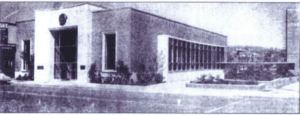
Seattle-First National Bank. Image credit: Construction News Bulletin, 1950.
Here’s the deal—we’re in a pickle: the Seattle-First National Bank Building (SFNB), located at 566 Denny Way in Uptown was designated a Seattle landmark in 2006. Walgreens purchased it after the designation, adapted the former bank into a retail store, and worked with the Landmarks Preservation Board (LPB) to reach a Controls and Incentives (C&I) agreement (in November 2021) that would apply to the site and exterior of the building. The last step in the landmark designation process is City Council approval of the C&I agreement, but we’re concerned Council may reject controls and incentives, thereby leaving the landmark vulnerable to demolition.
We need YOUR Help! Write to City Council before January 3 (ideally by December 23) and demand they honor the Landmarks ordinance and process by adopting controls and incentives for the Seattle-First National Bank building (reference CB 120312). A decision to reject controls and incentives for SFNB puts preservation and landmarking at risk! Contact all Councilmembers by emailing council@seattle.gov.
Context for said “pickle:” until recently, the SFNB has been declared as a building of significance (by virtue of its landmark designation), and a C&I agreement has been signed in which economic incentives are available to the property owner in exchange for committing to maintain the building.
You may recall from our ongoing Showbox advocacy efforts that landmark designation alone does not save buildings – controls and incentives are critical to protecting the places we love. The SFNB, having a designation and C&I agreement signed, means this building is well on its way to being preserved as an asset and public benefit to the City of Seattle. The final step is for the City Council to adopt Council Bill 120312.
OK, great! So, what’s the problem? On Friday, December 9, several members of the City Council’s Neighborhoods, Education, Civil Rights & Culture Committee met and challenged, without documentation or justification, the Seattle-First National Bank building’s landmark designation and the need to place controls and incentives on the building and site.
In advance of the meeting, Seattle City Council Central Staff provided the Committee with a 10-page memorandum detailing the landmarking process and recommendations for next steps. Additionally, the Committee received a joint letter of support for adopting controls and incentives for SFNB from Historic Seattle and the Queen Anne Historical Society.
The Council Committee’s recommendation to reject controls and incentives without reasons relevant to the Landmark Preservation Ordinance and in contradiction to the Landmarks Preservation Board (a group consisting of volunteers appointed by the Mayor and confirmed by City Council) is unprecedented and a major threat to preservation in Seattle and the City’s preservation program.
On Tuesday, January 3, 2023, Seattle City Council will decide whether to adopt the jointly agreed Controls and Incentives for the Seattle-First National Bank building. If rejected, the Council’s decision could undermine the landmark designation process for any designated landmark that doesn’t have controls and possibly any future designated landmarks.
This is NOT OK! Again, we urge you to write to City Council (council@seattle.gov) before January 3 (ideally by December 23) and demand they honor the Landmarks ordinance and process by adopting controls and incentives for the Seattle-First National Bank building (reference CB 120312).
Questions? Contact Eugenia Woo, Historic Seattle’s Director of Preservation Services, at eugeniaw@historicseattle.org.
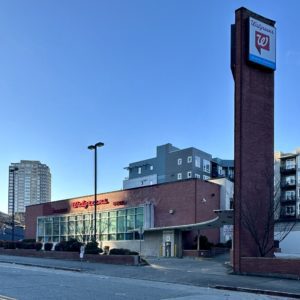
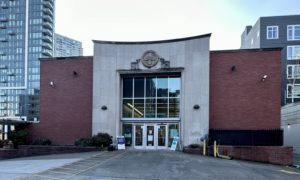
January and February have been filled with news in the preservation world. The following articles look at some controversial projects and issues–the good, the bad and the ugly.
Save Our Square – Pioneer Square
The big news from yesterday was the City Hearing Examiner’s ruling that overturns the Department of Neighborhoods Director’s decision to issue a Certificate of Approval for the proposed 11-story project at 316 Alaskan Way S in Pioneer Square. Save Our Square, advocates from the neighborhood, appealed the Director’s decision last fall, asserting that the project was out-of-scale with its surroundings and not in character with the historic district. Historic Seattle has been supporting SOS’s efforts and provided expert testimony at the hearing. The City Hearing Examiner ruled that the DON Director’s decision was “arbitrary and capricious and must be reversed.”
“Seattle’s approval of 12-story Pioneer Square building overturned,” Seattle Times, February 24, 2016.
An earlier article covered the hearing in January. “‘Miami Beach on Elliott Bay?’ Opponents decry proposed 12-story Pioneer Square building,” Seattle Times, January 21, 2016.
The City Hearing Examiner’s decision can be appealed to King County Superior Court. An appeal must be filed within 21 days of the decision.
Note the project is actually 11 stories, not 12 stories as reported in the media.
Save the Reactor – Nuclear Reactor Building, University of Washington
In December 2015, Docomomo WEWA filed a Seattle Landmark nomination application for the Nuclear Reactor Building (aka More Hall Annex), and shortly thereafter the university filed a lawsuit against Docomomo WEWA and the City of Seattle in King County Superior Court. With approval from the Council of Historic Seattle and the Board of Directors of the Washington Trust for Historic Preservation, both those organizations officially signed on as co-nominators with Docomomo WEWA when the final, revised landmark nomination was submitted just last week. Historic Seattle and the Washington Trust for Historic Preservation will also be added as intervenors in the lawsuit soon. The UW Board of Regents voted to demolish Nuclear Reactor Building on February 11. The preservation organizations have retained Dave Bricklin of Bricklin & Newman as their attorney.
Read Knute Berger’s Crosscut.com article about the the lawsuit and its broader implications beyond this one building. “UW launches attack on city’s historic preservation powers,” Crosscut.com, February 14, 2016.
Here’s Save the Reactor’s latest update on the issue.
Another SOS – Save Our Seminary, Saint Edward Seminary Building, Kenmore
State Parks held a public meeting on February 9 to gather comments on the proposal by Daniels Real Estate to rehabilitate the historic Saint Edward Seminary building at Saint Edward State Park in Kenmore. Plans are to convert the building into a hotel, modeled after the great lodges in national parks. Historic Seattle supports this proposal and offered public testimony in support at the February 9th meeting. Opponents at the public meeting voiced concern about turning over public property to private hands. They don’t feel a hotel/spa is appropriate for the park. Some would actually prefer to see the historic building deteriorate to the point of becoming a “ruin.”
Read more about the issue and the controversy surrounding the proposal. “Struggle over Saint Edward: Renovate it or tear it down?” Seattle Times, January 31, 2016.
Added 2/27/16: Blame the Victim – Landmark Seattle Times Block to be Mostly Demolished
The Seattle Department of Construction and Inspections (DCI) is allowing the owner of the old Seattle Times Block in South Lake Union (1120 John St) to demolish most of the building (there are actually three buildings). The owner, Onni Group of Vancouver, BC, purchased the property in 2013 and has not managed to properly secure the buildings, making it a target for vandals and squatters. The building’s condition has deteriorated since the Seattle Times vacated the property. DCI is invoking a part of the Landmarks Preservation Ordinance that is rarely used–the Director of DCI can approve the demolition of a Seattle landmark for public safety reasons. The Landmarks Preservation Board (LPB) has no say in the decision. Part of the main facades will probably be “saved” and incorporated into the new development (tall apartment towers). Approval for the preservation of the facades and the design for the new project will go through the LPB. Read more about this issue in this Seattle Times article.
All these advocacy efforts are ongoing. We’ll keep you up to date on the latest. Look for future calls to action for advocacy.
Photo: Rendering of proposed project at 316 Alaskan Way S, Pioneer Square / Gerding Edlen (from Department of Neighborhoods files)
The National Trust for Historic Preservation recently named the Panama Hotel in Seattle’s International District, a National Treasure. The National Trust recognizes the national historic and cultural significance of the Panama Hotel and the important stories it can help tell. The building is also a designated National Historic Landmark. Through the National Treasures program, a growing portfolio of more than 55 threatened buildings, neighborhoods, communities, and landscapes that stand at risk across the country, the National Trust will take direct action to protect the Panama Hotel and promote its rich history and significance. 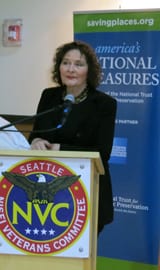
Along with Historic Seattle and current owner Jan Johnson, the National Trust is committing to long-term preservation and interpretation of the building and its collections. As owner of the hotel for the past 30 years, Ms. Johnson is preparing for the property’s next phase and with this National Treasure designation, the National Trust will collaborate with her and Historic Seattle to find a new steward and owner, while honoring the legacies of Johnson and previous owner Takashi Hori.
The National Treasure announcement was made at a special event on April 9 attended by over 160 people held at the Nisei Veterans Committee (NVC) building in Seattle. Speakers included NVC President Bruce Inaba, National Trust President Stephanie Meeks, Congressman Jim McDermott, Deputy Mayor Hyeok Kim who declared April 9 as “Panama Hotel Day” through a Mayoral Proclamation, Eugenia Woo of Historic Seattle, and Jan Johnson. A screening of The Panama Hotel Legacy short film was featured, highlighting the remarkable legacy of the 105 year-old property, particularly the continuous stewardship to preserve its history and educate current and future generations. A full length documentary film is in the works. The evening wrapped up with a powerful performance by Seattle Kokon Taiko, a performing group based in the local Japanese American community.
Learn more about the Panama Hotel as a National Treasure.
National Trust for Historic Preservation Blog
KPLU: Preservation Group Names Seattle’s Panama Hotel a National Treasure
KING 5: Seattle’s Panama Hotel Named a National Treasure
KIRO TV: Seattle’s Panama Hotel Designated as a National Treasure
Northwest Asian Weekly: Much Love for the Panama Hotel–Seattle has its National Treasure
Puget Sound Business Journal: Seattle International District’s Panama Hotel Deemed a ‘National Treasure’
SeattlePI.com: Seattle’s Panama Hotel is a National Treasure that Needs a New Owner
Photos: Panama Hotel sign; owner Jan Johnson at the National Treasures announcement event; Source: Eugenia Woo
An Advocacy Win for “Homestead Coalition”
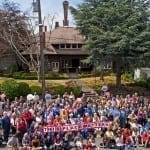 The preservation of the Alki Homestead in West Seattle has been a sustained advocacy effort for Historic Seattle since 2009. Originally known as the Fir Lodge, the Homestead is one of West Seattle’s most beloved landmarks. The 1904 log building has been vacant for over six years, after a 2009 fire caused significant damage and forced the closure of the Alki Homestead Restaurant.
The preservation of the Alki Homestead in West Seattle has been a sustained advocacy effort for Historic Seattle since 2009. Originally known as the Fir Lodge, the Homestead is one of West Seattle’s most beloved landmarks. The 1904 log building has been vacant for over six years, after a 2009 fire caused significant damage and forced the closure of the Alki Homestead Restaurant.
A coalition including Historic Seattle, Southwest Seattle Historical Society, 4Culture, and the Washington Trust for Historic Preservation has persistently advocated to save the building.
On Friday, March 13, the landmark property changed hands. Tom Lin, owner since 2005, sold the property to Mercer Island builder/investor Dennis Schilling, who plans to rehabilitate the landmark structure and construct a new six-unit apartment building on the adjacent parking lot. Mr. Schilling forged an agreement with the Southwest Seattle Historical Society, which holds an easement on the Alki Homestead parking lot and operates the Log House Museum one-half block to the south.
On Saturday, March 14, the Southwest Seattle Historical Society and Schilling put on a press conference to formally announce the news of the Homestead’s future. For details about the press conference and links to local and national media coverage, check out the Society’s post on its website.
Photos: Alki Homestead (2012), Historic Seattle; “This Place Matters” photo event (2010), Jean Sherrard

View of the north and west facades of the historic Louisa Building in the Chinatown-International District. A Christmas Eve 2013 fire burned the western half of the building.
MAin2 has been following the Louisa Hotel’s status after the western half of the building burned in a fire on December 24, 2013. This historic Chinatown-International District building, built in 1909, housed some of the neighborhood’s longest operating businesses including Mon Hei Bakery and Sea Garden Restaurant. All businesses have remained closed since the fire.
Here’s a Louisa Building FAQ from the property owner.
The Seattle Weekly’s current issue (March 19-25, 2014) features a an excellent cover story on the building and the neighborhood.
Here’s a building update from the City of Seattle (sent to community members on March 7, 2014):
We write to you today to provide an update on the status of the fire-damaged Louisa Hotel building located at 669 South King Street. There has been some information in the news as of late, which we wanted to clarify. As of March 5, the Department of Planning and Development (DPD) and the Seattle Department of Neighborhoods (DON) began reviewing a permit application to stabilize the existing building to remove safety concerns for neighboring tenants and the public. The proposal requires removal of the west wall on Maynard Alley, which was most severely damaged by the fire. The remaining portions of the building will be braced and stabilized until future renovations can occur. There are no plans to demolish the entire building at this time.
Both the City and the property owners are motivated to act quickly and preserve as much of the existing building as possible. A permit will be issued shortly, which could allow work to begin by late-March. Once the building is fully stabilized, it will allow private engineers to further evaluate the structure and help us determine the appropriate next steps regarding future redevelopment. Attached is a fact sheet prepared by the owners of the building which provides answers to common questions and contact information for the community.
If you have questions about the status of the permit, please feel free to contact Bryan Stevens of the Department of Planning and Development. He can be reached at bryan.stevens@seattle.gov or 206-684-5045.